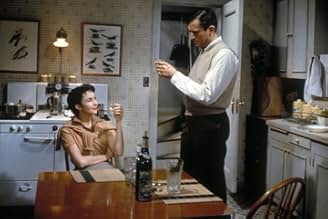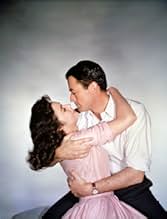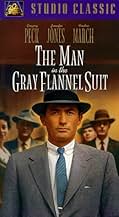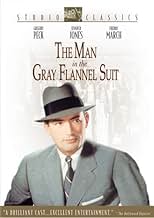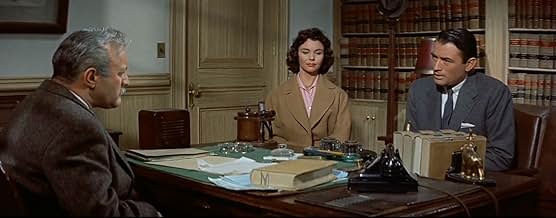PUNTUACIÓN EN IMDb
7,1/10
4,2 mil
TU PUNTUACIÓN
Un ex soldado se enfrenta a cuestiones éticas mientras intenta ganar lo suficiente para mantener bien a su mujer y a sus hijos.Un ex soldado se enfrenta a cuestiones éticas mientras intenta ganar lo suficiente para mantener bien a su mujer y a sus hijos.Un ex soldado se enfrenta a cuestiones éticas mientras intenta ganar lo suficiente para mantener bien a su mujer y a sus hijos.
- Premios
- 1 premio y 3 nominaciones en total
Tristram Coffin
- Byron Holgate
- (escenas eliminadas)
William 'Bill' Phillips
- Antonio Bulaga
- (escenas eliminadas)
Argumento
¿Sabías que...?
- CuriosidadesOne of Gregory Peck's movie children was played by Portland Mason, who was the daughter of actor James Mason, and an Italian delivery boy was played by Johnny Crawford a few years before he would achieve fame on the popular TV Western, El hombre del rifle (1958).
- PifiasIt is believed by some that Tom shifting his car into reverse then driving away forward at the end of the film is a goof. However, the car is a manual transmission Ford with a column-shifted 3 speed manual transmission with an unsynchronized first gear. A quirk of that style transmission is that at a standing stop, getting the transmission into 1st gear when the engine is running is easiest if the operator first abruptly lifts the shift lever from neutral to place the transmission into second gear, then back down into first. This prevents clash (grinding) of the unsynchronized first gear. Drivers of the era, including Tom Rath, would have been well familiar with this technique.
- Citas
Tom Rath: I don't know anything about public relations.
Bill Hawthorne: Who does? You've got a clean shirt and you bathe every day. That's all there is to it.
- Créditos adicionalesOnce it fades in, the 20th Century Fox logo (set to the film's dramatic opening credits music, rather than the traditional Fox fanfare) appears in a slightly smaller CinemaScope windowbox, slowly panning to normal size (correctly fitting the CinemaScope screen) before fadeout.
- ConexionesFeatured in The Fifties (1997)
- Banda sonora(I'm a) Ramblin' Wreck from Georgia Tech
(1908) (uncredited)
Lyrics by Billy Walthall
Music by Frank Roman and Mike Greenblatt
based on "Son of a Gambolier"
Music by Charles Ives (1895)
Played on the ukulele by Gregory Peck
Reseña destacada
I had trouble finding this film in the local video store but finally saw it on television. It's well worth watching. It's a wonderful commentary on the American suburban corporate culture emerging in the years following the second World War. Peck plays the stereotypical businessman living in Connecticut and taking the New Haven Railroad into New York City each day. He is faced with a number of seemingly mundane dilemmas, such as settling a deceased relative's estate, how to deal with a dissatisfied wife more ambitious than he, whether to switch jobs for better pay, and whether he should tell his new boss what he *needs* rather than *wants* to hear. Hanging over him are the ever-present memories of his wartime combat experience, which intrude on him occasionally especially during those otherwise empty hours spent commuting on the train.
I disagree with the reviewer who found the film boring apart from the war scenes. One of the reasons why this film works so well is that it regularly jolts the viewer, nearly lulled into complacency by the apparent ordinariness of suburban life, with those sudden flashbacks of the horrors of war. The juxtaposition of these quite different scenes was quite deliberate and speaks volumes in itself. How is it possible for someone who has spent four years both killing and avoiding death to settle into a normal life of family and work? Obviously it's not easy.
Furthermore, death continues to haunt the family in various, almost light-hearted ways, particularly by way of the children who were born after the carnage had ended and for whom death is no more real than the gunfights in those television westerns to which they are so conspicuously addicted. A scene near the beginning has one of the girls suffering from chicken pox, a fairly minor malady, as everyone knows. But she tells her father she has "small pox" and her sister keeps teasing her with the morbid suggestion that she is going to die. The father tells her to stop, but she keeps it up. He knows what death is all about; his children do not.
The term "workaholic" had not yet been coined in 1956, but the contrast between the man who chooses a fuller, less driven life including time for family and the man married to his career could not have been more starkly portrayed. The viewers find themselves applauding the choice Peck eventually makes and pitying March for not having done so himself.
I am a great fan of the score's composer, Bernard Herrmann, whose music is uniquely capable of evoking a range of strong emotions in the listener. The music here is typically Herrmann, although it is not as central a "character" in this film as are his scores in, say, "Vertigo" and "Psycho." It is impossible to imagine the latter two films without the music, while this film seems less obviously dependent on its score.
Although I quite liked this film, it is overly long and could have been better edited. The several subplots needed to be better integrated into the whole. What, for example, was the purpose of the challenge to Peck's inheritance, other than to show the persistent salvific role Cobb played in his life? This subplot could easily have been cut and the film would have suffered nothing in terms of its overall impact. In fact, it might have been better for being more tightly constructed.
I disagree with the reviewer who found the film boring apart from the war scenes. One of the reasons why this film works so well is that it regularly jolts the viewer, nearly lulled into complacency by the apparent ordinariness of suburban life, with those sudden flashbacks of the horrors of war. The juxtaposition of these quite different scenes was quite deliberate and speaks volumes in itself. How is it possible for someone who has spent four years both killing and avoiding death to settle into a normal life of family and work? Obviously it's not easy.
Furthermore, death continues to haunt the family in various, almost light-hearted ways, particularly by way of the children who were born after the carnage had ended and for whom death is no more real than the gunfights in those television westerns to which they are so conspicuously addicted. A scene near the beginning has one of the girls suffering from chicken pox, a fairly minor malady, as everyone knows. But she tells her father she has "small pox" and her sister keeps teasing her with the morbid suggestion that she is going to die. The father tells her to stop, but she keeps it up. He knows what death is all about; his children do not.
The term "workaholic" had not yet been coined in 1956, but the contrast between the man who chooses a fuller, less driven life including time for family and the man married to his career could not have been more starkly portrayed. The viewers find themselves applauding the choice Peck eventually makes and pitying March for not having done so himself.
I am a great fan of the score's composer, Bernard Herrmann, whose music is uniquely capable of evoking a range of strong emotions in the listener. The music here is typically Herrmann, although it is not as central a "character" in this film as are his scores in, say, "Vertigo" and "Psycho." It is impossible to imagine the latter two films without the music, while this film seems less obviously dependent on its score.
Although I quite liked this film, it is overly long and could have been better edited. The several subplots needed to be better integrated into the whole. What, for example, was the purpose of the challenge to Peck's inheritance, other than to show the persistent salvific role Cobb played in his life? This subplot could easily have been cut and the film would have suffered nothing in terms of its overall impact. In fact, it might have been better for being more tightly constructed.
- Dtkoyzis
- 10 abr 2001
- Enlace permanente
Selecciones populares
Inicia sesión para calificar y añadir a tu lista para recibir recomendaciones personalizadas
- How long is The Man in the Gray Flannel Suit?Con tecnología de Alexa
Detalles
- Fecha de lanzamiento
- País de origen
- Sitio oficial
- Idiomas
- Títulos en diferentes países
- The Man in the Gray Flannel Suit
- Localizaciones del rodaje
- Empresa productora
- Ver más compañías en los créditos en IMDbPro
Taquilla
- Presupuesto
- 2.670.000 US$ (estimación)
- Duración2 horas 33 minutos
- Color
- Relación de aspecto
- 2.55 : 1
Contribuir a esta página
Sugerir un cambio o añadir el contenido que falta

Principal laguna de datos
By what name was El hombre del traje gris (1956) officially released in India in English?
Responde

